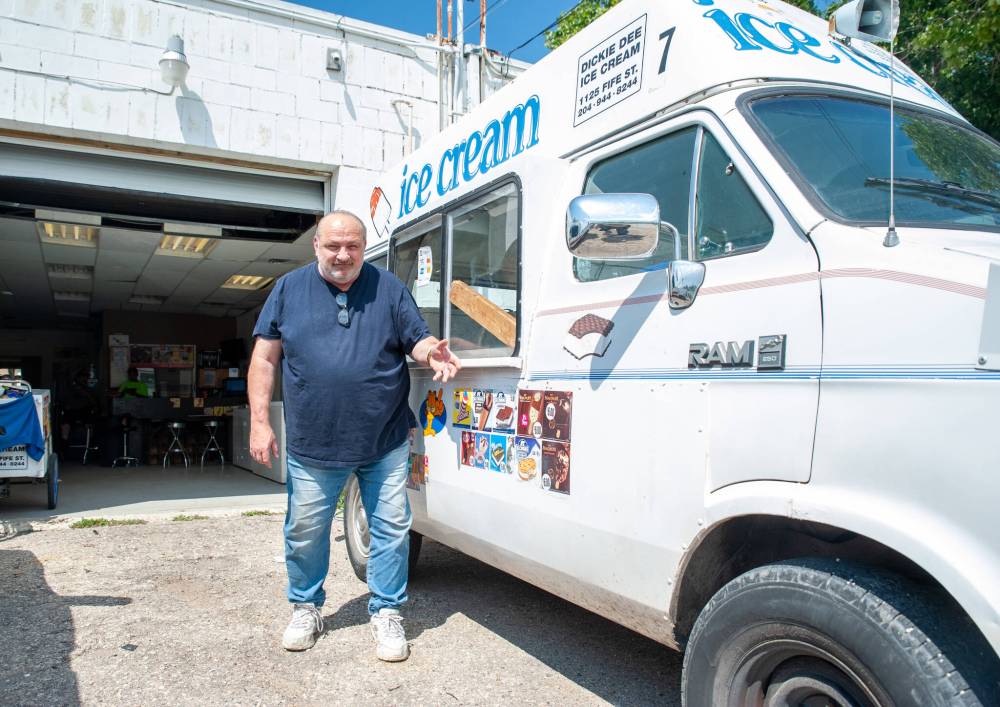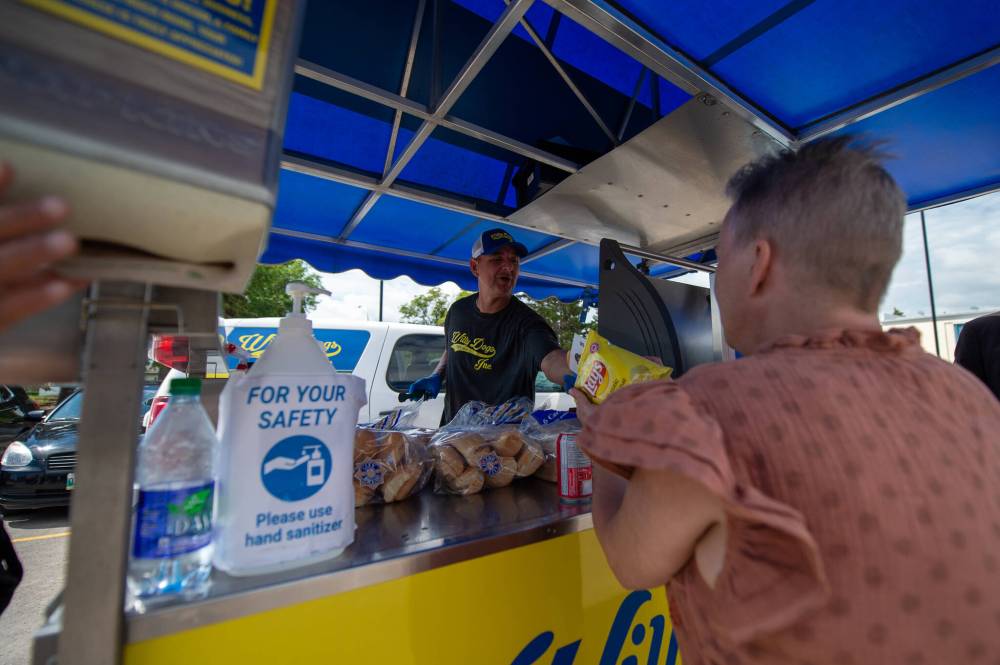Inflation melting seasonal businesses Ice cream vendors, hot dog carts struggle to keep prices down as costs continue to soar
Read this article for free:
or
Already have an account? Log in here »
To continue reading, please subscribe:
Monthly Digital Subscription
$19 $0 for the first 4 weeks*
- Enjoy unlimited reading on winnipegfreepress.com
- Read the E-Edition, our digital replica newspaper
- Access News Break, our award-winning app
- Play interactive puzzles
*No charge for 4 weeks then billed as $19 every four weeks (new subscribers and qualified returning subscribers only). Cancel anytime.
Read unlimited articles for free today:
or
Already have an account? Log in here »
Hey there, time traveller!
This article was published 03/08/2022 (778 days ago), so information in it may no longer be current.
Soaring inflation and rising fuel costs are melting away the profits of a summer tradition — ice cream trucks and bikes.
Those same pressures are also taking a bite out of many of the city’s hot dog carts.
Ice cream trucks and street vendors — like hot dog stands — are grappling with what some call their worst year, between inflation, storms and other factors beyond their control.
“I’ve never had to raise my prices as high as I have because of the ice cream prices and the fuel and everything, the cost of parts,” said Jeff Hubka, owner of Dickie Dee Ice Cream in Winnipeg.
“I’ve never had to raise my prices as high as I have because of the ice cream prices and the fuel and everything, the cost of parts.”– Jeff Hubka
Hubka joined the company at 12 years old, as an ice cream bike rider. He’s owned the business, which now operates 15 bikes and five trucks, for around three decades.
“People… tell me I have Fudgsicle in my blood,” Hubka said.
A Fudgsicle he once sold for 10 cents now goes for $3, he said.
It’s typical for prices to increase annually. However, ice cream costs usually jump three to five per cent, according to the North American Ice Cream Association.
This year, prices leaped 10 to 15 per cent in some areas, Steven Christensen, the association’s executive director, told the Canadian Press.
The rising cost of dairy plays a role, Christensen later told the Free Press.
“Ice cream trucks and vans have their own challenges,” he said, noting soaring gas prices.
Many vans idle at locations because their ice cream equipment is hooked up to the motor, Christensen said.
Dickie Dee drivers pay their own fuel. A $40 fuel-up should cover an eight-hour shift, Hubka said. Last summer, a $20 bill would’ve been sufficient, he added.
ETHAN CAIRNS / WINNIPEG FREE PRESS Extreme weather and rising costs have taken a bite out of Dickie Dee's business, says owner Jeff Hubka.
Supplies like cups, spoons and napkins have become more costly.
Still, the hardest part isn’t the climbing cost of goods, Hubka said — it’s the weather.
“You can always… increase costs of the company to keep going,” he said. “You have to eat some of it, you make less money. But we’re a vending business — if we don’t go out, we don’t make money.”
April and May brought “the worst spring I’ve ever seen,” Hubka said.
Bikes and vans are usually out in April. This year, the earliest they hit the streets was May — and that was only for eight days, compared to the usual 20, Hubka said.
“You have to eat some of it, you make less money. But we’re a vending business– if we don’t go out, we don’t make money.” — Jeff Hubka
“We’re a month behind,” he said. “That’s a lot of selling ice cream.”
The rain hasn’t helped, nor has extreme heat. The trucks overheat, the employees manning the ice cream bikes can’t do their job, and Dickie Dee loses business.
A perfect ice cream selling day lands in the 25 C to 28 C range, Hubka said.
He hasn’t thought much about climate change and extreme weather impacting his business in the future. He won’t let the current year slow him down, he said.
“I just take it a year at a time,” he said. “We’ll deal with whatever comes, and we’ll just keep going.”
Trekking onwards is also part of Will Gault’s business plan. The Willy Dogs owner estimates his expenses have increased 25 to 30 per cent this year.
ETHAN CAIRNS / WINNIPEG FREE PRESS 
“Everything as a whole, across the board, has really significantly gone up, which has to unfortunately go back to the consumer,” Gault said. “With some of these special events that we usually cater, it’s just no longer in the company’s budget to hire us.”
Gault said he used to pay $18 for a 50 lb bag of onions. The same purchase now costs $46, he said.
Ketchup, sauerkraut, hot peppers, buns, meat, propane — all have heftier price tags.
“It’s like every time you seem to go back to the store… you’re almost holding your breath,” Gault said.
Inflation is hitting at the same time as construction season. He’s had to move his cart from its usual spot near St. Boniface Hospital; as a result, business has dropped more than 50 per cent, he said.
The spring storms snowed out business — “you can’t be sliding (hotdog stands) on sidewalks when it’s still covered in ice,” Gault said — and rain continues to keep customers away.
“I love what I do,” Gault said. “I would be devastated if due to any more hikes and weather that I couldn’t have my livelihood anymore.”
“Everything as a whole, across the board, has really significantly gone up, which has to unfortunately go back to the consumer.”– Willy Dogs owner Will Gaulta
Further expense increases would be “a worst nightmare,” he added.
Richard Monkman, owner of Richie’s Home of the Big Smokey, largely sticks to private events with his hotdog stand now.
“The weather is costing me a lot,” he said.
Bags of buns would go bad after days of being rained out, Monkman said. With a private event, he knows how much to purchase.
“The money’s paid in advance, and… you don’t lose your product,” he said.
The weather has “significantly impacted” many business sectors, including agriculture and tourism, noted Elisabeth Saftiuk, the Manitoba Chambers of Commerce’s vice-president of policy and government relations.
“The weather is costing me a lot.”– Richard Monkman
“I think that COVID has shown that businesses are extremely resilient,” Saftiuk said. “I suspect that will continue, whether it’s because of a global pandemic or whether it’s because of weather.”
Both Dickie Dee and Willy Dogs were able to operate their businesses during pandemic-era lockdowns. Hubka said ice cream bikes and vans were out for more hours as kids learned from home.
gabrielle.piche@winnipegfreepress.com

MIKAELA MACKENZIE / WINNIPEG FREE PRESS Will Gault, who experienced homelessness and struggled with finding food a few years ago, now runs a restaurant at the Deer Lodge Curling Club and shares his success with people through comfort and food in Winnipeg on Tuesday, Dec. 4, 2018. Winnipeg Free Press 2018.

Gabrielle Piché
Reporter
Gabby is a big fan of people, writing and learning. She graduated from Red River College’s Creative Communications program in the spring of 2020.
Our newsroom depends on a growing audience of readers to power our journalism. If you are not a paid reader, please consider becoming a subscriber.
Our newsroom depends on its audience of readers to power our journalism. Thank you for your support.









